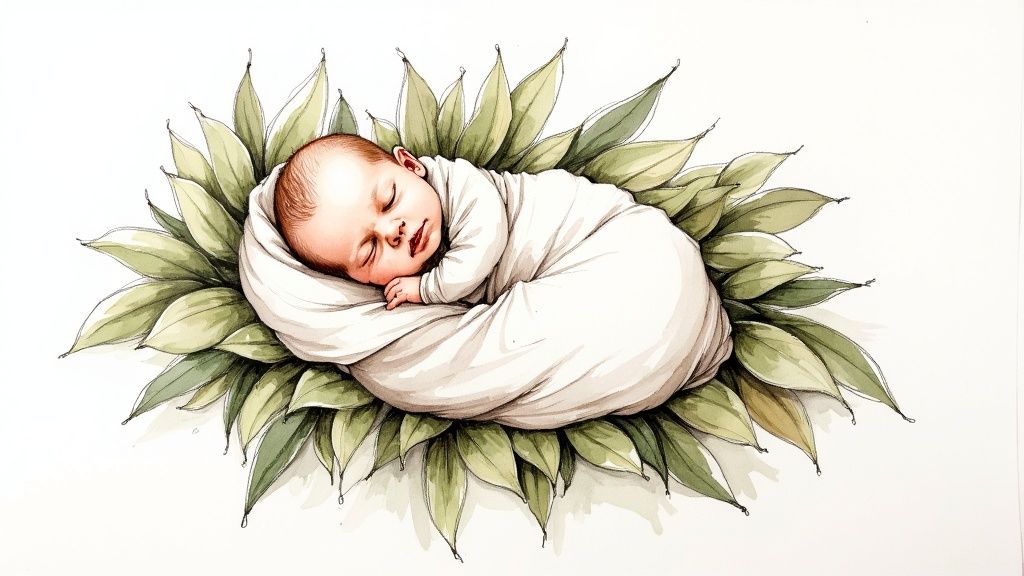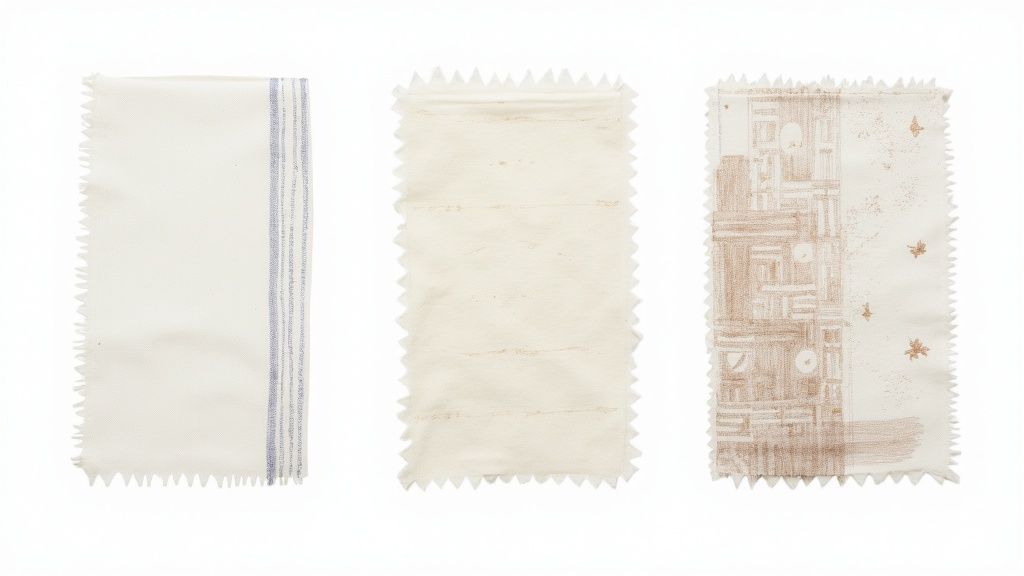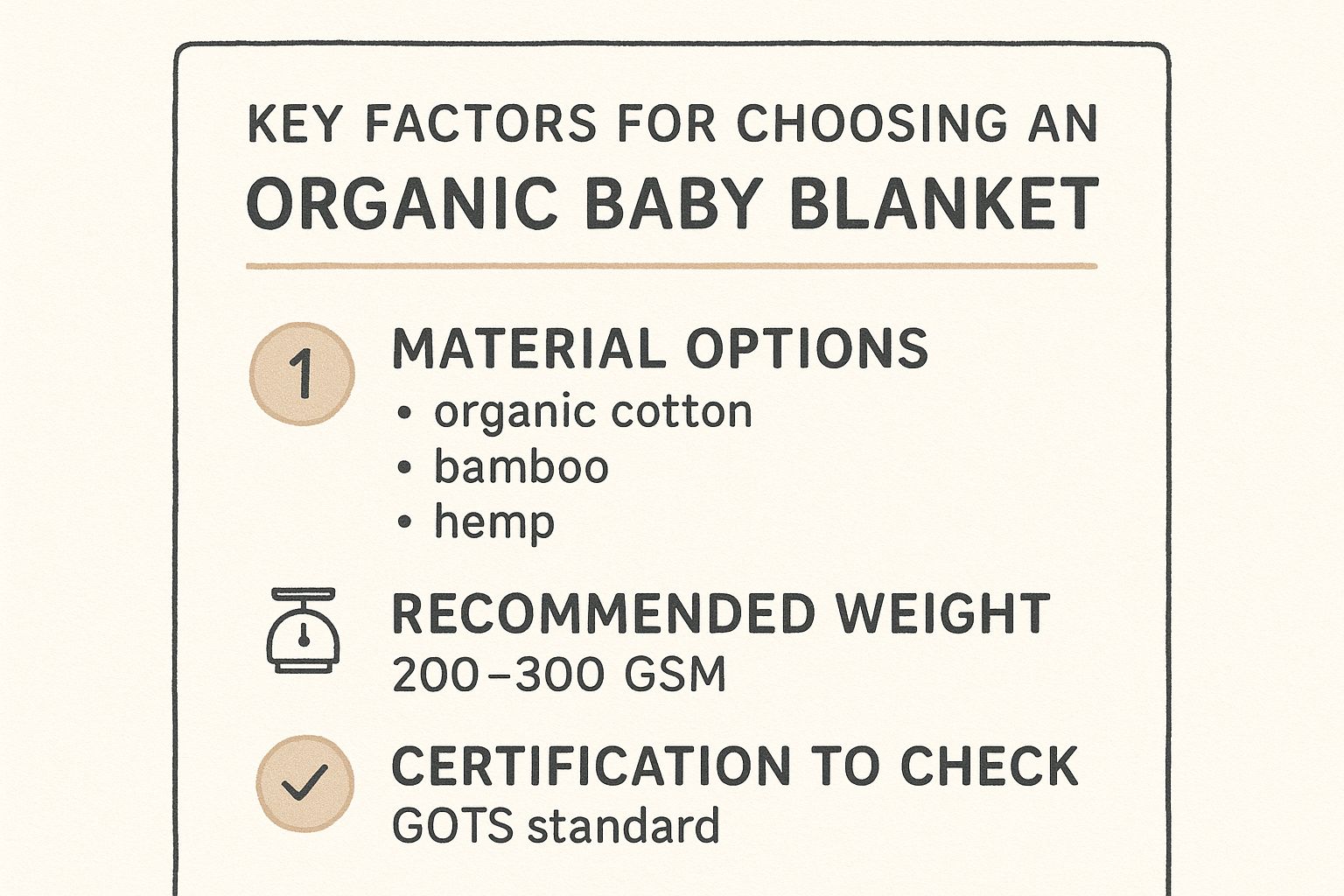When you're preparing for your new arrival, choosing an organic baby blanket is one of the first, most thoughtful decisions you'll make. It’s so much more than just another layer for warmth; it’s a promise of comfort, safety, and a gentle welcome to a world that can be tough on delicate new skin.
Why an Organic Cotton Blanket Is More Than Just a Cosy Layer

As you welcome your baby, every choice feels huge, from the milk they drink to the fabrics that touch their skin. A baby’s skin is their first line of defence, but it’s incredibly thin and porous, making it far more sensitive to anything it comes into contact with.
A great way to think about it is like choosing organic food. You pick organic fruit and vegetables to sidestep pesticides and artificial chemicals because you know that what goes into your baby’s body is vital. The very same logic applies to what goes on their body. Conventional cotton fabrics are often treated with a whole host of chemicals, from pesticides sprayed on cotton fields to harsh dyes and finishing agents used in factories.
An organic baby blanket, especially one made from pure organic cotton, simply does away with these worries. It provides a clean, untainted cocoon for your little one.
The Gentle Power of Organic Cotton
There's a good reason why organic cotton is considered the gold standard for baby blankets. It’s grown and processed without nasty chemicals, meaning no harmful residues are left behind to potentially irritate skin or trigger allergies. This makes it the perfect material for creating a safe and peaceful space for your baby.
- Purity: Organic cotton is grown without any synthetic pesticides, herbicides, or genetically modified organisms (GMOs).
- Safety: The fabric is processed without harsh chemicals like chlorine bleach or formaldehyde, which are often used to finish conventional cotton textiles.
- Softness: Because the natural cotton fibres aren't weakened by chemical treatments, the final fabric is naturally softer and lasts longer.
Choosing organic cotton is an act of proactive care. It’s about creating a personal environment for your baby that is as pure, safe, and nurturing as possible, right from their very first day.
This conscious choice is becoming more and more popular. The UK organic baby blanket market is part of a growing movement, fuelled by parents who are increasingly concerned about health and sustainability. As more of us look for safer alternatives, the demand for products free from pesticides and harmful chemicals has soared. You can read more about the growth of the organic baby market and what’s driving it.
This trend shows that when you buy an organic cotton blanket, you're not just buying a product. You're joining a community of parents committed to a healthier start for their children and for the planet.
Decoding The Organic Cotton Label
 When you see the word "organic" on a baby blanket label, what does that really mean? It’s not just a marketing buzzword. It’s a promise of a cleaner, kinder journey, from a tiny cotton seed in the ground all the way to the soft fabric you wrap around your little one. Knowing what goes into it helps you choose with confidence.
When you see the word "organic" on a baby blanket label, what does that really mean? It’s not just a marketing buzzword. It’s a promise of a cleaner, kinder journey, from a tiny cotton seed in the ground all the way to the soft fabric you wrap around your little one. Knowing what goes into it helps you choose with confidence.
At its heart, an organic baby blanket starts its life in a field that’s free from synthetic chemicals. Conventional cotton farming can be a pretty harsh process, often relying on a cocktail of chemical inputs. Organic cotton farming, on the other hand, works with nature, not against it. That means no genetically modified (GMO) seeds, no toxic pesticides, and no synthetic fertilisers.
This gentler approach makes a world of difference. It keeps the farmers safe from harmful exposure, protects the local wildlife and, because the soil is so much healthier, it holds onto water far better, often using significantly less. What you get is a purer raw material, which is the perfect starting point for a softer, safer blanket.
From Farm To Fabric: The GOTS Guarantee
The organic promise doesn't stop once the cotton leaves the farm. For a blanket to be genuinely organic, the entire manufacturing process has to follow strict rules. This is where certifications become your best friend, and the one you really want to look for is the Global Organic Textile Standard (GOTS).
Spotting a GOTS logo is your seal of approval. Think of it as a guarantee that the product has been carefully checked and verified at every single step of its creation.
A GOTS certification means the blanket contains at least 95% certified organic fibre. It also confirms that every stage—from spinning and weaving to dyeing and finishing—is free from nasty chemicals like toxic dyes, chlorine bleach, or formaldehyde.
What GOTS Certification Ensures
The GOTS standard is incredibly thorough, covering both environmental and social responsibilities. It’s a complete package. Here’s a quick breakdown of what it guarantees:
- Environmental Purity: Banning hazardous chemicals throughout the entire supply chain. This ensures the final product you bring home is free from any residues that could irritate delicate skin.
- Worker Welfare: Enforcing strict social criteria based on the International Labour Organisation's core principles. This means fair wages and safe working conditions for every person involved in making the blanket.
- Authentic Claims: Offering full traceability from field to finished product. You can rest easy knowing the "organic" claim is legitimate and not just clever marketing.
Learning to read these labels is so important. You’ll see plenty of products labelled 'natural' or 'eco-friendly', but these terms are often vague and aren't regulated. When you’re shopping for genuine organic baby blankets, it pays to know how to avoid greenwashing tactics that can easily mislead. You can also dive deeper into the difference between natural and synthetic fibres to feel even more empowered.
By looking for the GOTS logo, you cut through all the noise. You’re choosing a product that is backed by a rigorous, world-renowned standard, ensuring the purest comfort for your baby.
The Health and Comfort Benefits for Your Baby

When you choose an organic baby blanket, you're doing so much more than just picking out a lovely accessory for the nursery. You're wrapping your little one in a layer of pure comfort and health, carefully considering the unique needs of their delicate system. The benefits are tangible, starting with the very feel of the organic cotton against their skin.
Because organic cotton fibres aren't weakened by harsh chemical processing, they stay exceptionally soft and smooth. This is absolutely crucial for a newborn’s skin, which is far thinner and more susceptible to chafing and irritation than our own. A conventional blanket might feel soft on the shelf, but its fibres can be surprisingly brittle and rough, leading to discomfort for your baby.
This commitment to gentle materials brings incredible peace of mind. By opting for certified organic cotton, you can be sure the blanket is free from the residues of toxic dyes, chlorine bleach, and other finishing agents you work so hard to avoid elsewhere in your baby’s life.
Creating a Naturally Safe Sleep Space
Beyond its lovely softness, one of the biggest advantages of organic cotton is that it's naturally hypoallergenic. As it’s grown and processed without synthetic pesticides or harsh chemicals, it’s much less likely to trigger allergic reactions, eczema, or skin rashes.
This helps create a truly serene sleep environment where your baby can rest without nagging irritation. What’s more, organic cotton is wonderfully breathable – a key factor in keeping your baby comfortable and, most importantly, safe.
The natural structure of cotton fibres allows air to circulate freely. This helps your baby maintain a stable body temperature, keeping them warm and cosy without the risk of overheating—a critical aspect of safe sleep practices.
The importance of this natural thermal regulation is even recognised in professional healthcare. Specialty organic baby blankets often play a vital role in neonatal units, where the safety and stability provided by natural cotton fibres are paramount. It just goes to show how trusted these materials are for even the most vulnerable infants.
Supporting Your Parenting Journey
Providing a safe, natural sleeping environment with an organic cotton blanket is a wonderful step. As you continue on this journey, exploring comprehensive resources for parents-to-be can further equip you with essential knowledge for your baby's early years. Taking this kind of holistic approach helps you feel confident and prepared.
The combined benefits of an organic baby blanket made from cotton really speak for themselves:
- Superior Softness: Unbroken, natural cotton fibres that are gentle on delicate skin.
- Hypoallergenic: Free from chemical irritants that can cause rashes or allergies.
- Breathable Comfort: Allows for natural airflow to prevent overheating.
- Chemical-Free: No residues from pesticides, toxic dyes, or harsh processing agents.
Ultimately, choosing organic cotton is an act of love. It’s a simple but powerful way to create a healthier, more comfortable world for your baby, one cosy night's sleep at a time.
How to Choose the Perfect Organic Cotton Blanket
Walking into a shop or browsing online for the perfect organic baby blanket can feel a little daunting. With so many colours, patterns, and styles, where do you even start? But here's a little secret from those of us who have been there: once you look past the aesthetics, choosing the right blanket is actually quite straightforward. The real difference-maker lies in the fabric's weave, weight, and size.
Getting these details right is what transforms a simple blanket from a pretty accessory into a truly functional, comforting, and well-loved part of your baby's world. It all starts with understanding how the blanket is made. Not all organic cotton is created equal; the way the threads are woven or knitted completely changes how the blanket feels and what it’s best used for. This is how you find one that's perfect for swaddling, and another that’s ideal for keeping your little one snug in their cot on a chilly night.
This guide will walk you through the key things to look for—from the type of weave and fabric weight to the certifications that really matter.

As you can see, while starting with organic cotton is a fantastic first step, factors like the blanket's weight and a trustworthy GOTS label are what seal the deal.
Matching Your Organic Blanket to Your Baby's Needs
To help you find the right fit, it helps to understand how different organic cotton blanket types are designed for different jobs. From lightweight swaddles for a newborn to a cosy quilt for a growing toddler, here’s a look at the most common options and what they do best.
| Blanket Type | Primary Use | Key Features | Best Season |
|---|---|---|---|
| Cellular Blanket | Safe sleep, cot layering | Breathable with small holes for airflow, lightweight. | Year-round |
| Muslin Swaddle | Swaddling newborns, burp cloth | Ultra-lightweight, soft, slight stretch for a snug fit. | Spring/Summer |
| Knit Blanket | Cuddles, pram/car seat | Stretchy, soft, and comforting with a bit of weight. | Autumn/Winter |
| Quilted Blanket | Tummy time, toddler bed | Thicker, padded for comfort, durable. | Winter/Cooler Months |
Ultimately, having a few different types of organic cotton blankets on hand means you’re always prepared, whether it’s for a nap, a trip out in the pram, or just some quality time on the play mat.
Getting the Weave and Quality Spot On
Let's dive a bit deeper into the most popular organic cotton weaves you'll come across. Each one has a distinct feel and purpose, and having a couple in your nursery toolkit is a smart move.
Here are the must-know styles and what they’re brilliant for:
- Cellular Weave: This is the undisputed champion for safe sleeping. Its clever design is full of tiny holes that let air move freely, which is crucial for preventing your baby from overheating while still keeping them warm. Honestly, it’s a non-negotiable for the nursery.
- Muslin Weave: Famous for being incredibly soft, light, and airy, muslin is the go-to for swaddling. The cotton fabric has a gentle "give" to it, which means you can get a secure wrap that feels like a hug but still allows for comfortable wiggles.
- Knit Weave: Just think of your favourite cosy jumper. A knit cotton blanket offers that same comforting weight and gentle stretch. It's perfect for snuggles on the sofa, tucking around your baby in the pram, or as an extra layer when the temperature drops.
Thinking About Size and Craftsmanship
Once you've decided on the weave, the next thing to consider is size. A smaller blanket might be just right for the car seat, but you'll need something larger for the cot or for spreading out on the floor during tummy time. It’s always a good idea to measure the main space you’ll be using it to make sure you get a good fit.
Quality craftsmanship is what makes a blanket last for years, becoming a cherished keepsake rather than just another baby item.
When you’re looking at a blanket, take a close look at the stitching. You want to see tight, even seams around all the edges. This is a tell-tale sign of a well-made product that will hold its shape and withstand countless cycles in the washing machine.
And finally, my last piece of advice is to always, always check for that GOTS certification label. This is your guarantee that the blanket you’re buying meets the highest global standards for both organic purity and ethical production. It’s the simplest, most reliable way to know you’re getting a truly high-quality organic baby blanket that's safe, soft, and made with care.
Caring for Your Organic Blanket to Make It Last
When you choose an organic cotton blanket, you're not just buying a piece of fabric; you're investing in something truly special. It's an investment in quality, softness, and a keepsake that will be part of countless snuggles and adventures. Taking proper care of it means that investment pays off, keeping the blanket beautifully soft and in great shape for years to come.
The secret lies in preserving the natural integrity of the organic cotton fibres. Unlike conventional fabrics loaded with chemicals, organic cotton gets its luxurious feel from its pure, strong fibres. Gentle handling is all it takes to make that incredible softness last.
The Best Way to Wash and Dry Your Blanket
The golden rule for looking after an organic baby blanket is to be gentle. Natural cotton fibres really don't get on with harsh detergents and high heat. Your best bet is always a mild, eco-friendly liquid detergent – look for one that's free from phosphates, chlorine, and synthetic fragrances.
These kinder detergents clean just as well but won't strip the cotton of its natural softness or leave behind any nasty residues that could irritate your baby’s delicate skin. It's worth remembering that what you wash the blanket with is just as important as the blanket itself.
Just follow these simple steps at wash time:
- Stick to a Cold, Gentle Cycle: Always wash your blanket in cold water on a delicate or gentle setting. This is the best way to prevent shrinking and stop the cotton fibres from getting stressed.
- Say No to Fabric Softeners: You might think you're adding softness, but fabric softeners actually coat cotton fibres in a waxy film. This makes them less breathable and absorbent. For a natural alternative, a splash of white vinegar in the rinse cycle works wonders.
- Tumble Dry on a Low Setting: High heat is the enemy of cotton, making the fibres brittle and causing them to shrink. Pop it in the tumble dryer on the lowest heat setting, or even better, hang it up to air dry.
Properly caring for natural fibres ensures they maintain their best qualities over time. This not only applies to blankets but to all organic garments, helping you build a sustainable and long-lasting wardrobe for your little one.
Tackling Stains Naturally
Let's be realistic – spills and messes are just part of life with a baby. But you don't need to reach for harsh, chemical-heavy stain removers. For most common stains, a simple, natural solution can work like a charm.
Try making a paste from baking soda and a little water. Just apply it directly to the stain, leave it for 15-20 minutes, and then gently rinse it off before washing as normal. It’s an effective fix and, most importantly, completely safe for your baby’s blanket. You can discover more fantastic tips in our guide on how to care for natural fibres.
Why So Many UK Parents are Going Organic
When you pick out an organic baby blanket, you’re doing more than just choosing something soft for your little one. You're becoming part of a huge, and growing, movement. All over the UK, there's a real shift happening as parents make a conscious decision to buy products that are gentler on their babies and on our planet. This "green parenting" wave is truly changing the game for baby essentials.
This isn't just a fleeting trend. It's a thoughtful response to a growing awareness about what actually goes into the things we use every day. Parents are now actively looking for items that reflect their own values of health, safety, and long-term sustainability. Because of this, brands are finally feeling the pressure to provide more ethical and eco-friendly choices, which helps create a better, safer market for all of us.
The Shift Towards Mindful Buying
The rising demand for organic cotton really tells the story here. Market research predicts that by 2025, a staggering 20-25% of all baby blankets sold in high-end UK shops will be either organic or sustainably made. That's a massive jump from the single digits we saw just ten years ago, all driven by this green parenting movement and campaigns highlighting the benefits of sustainable textiles. You can find more detailed market trend insights here.
This groundswell creates a wonderful ripple effect. The more of us who choose an organic baby blanket, the more pressure it puts on brands to clean up their act and be more transparent about how they make things. It’s a powerful form of collective action that makes safer, higher-quality products more widely available for every family.
Choosing an organic blanket is like casting a vote for the kind of world you want your child to inherit—one where quality, safety, and environmental care are simply the norm, not a luxury.
At the end of the day, this movement backs up your own personal choice. It’s proof you’re part of a community of caring parents who are pushing for real, positive change. By going organic, you're helping to build a more sustainable future, one cosy blanket at a time.
Your Questions Answered: Getting to Grips with Organic Baby Blankets
As you start looking for the perfect organic baby blanket, it’s completely normal to have a few questions pop up. Feeling sure about your decision means getting clear, honest answers. So, let's dive into some of the most common queries we hear from parents, reinforcing just how wonderful choosing organic can be.
Are Organic Cotton Baby Blankets Really Worth the Higher Price Tag?
In a word, yes. Think of it less as a purchase and more as an investment in your baby’s immediate health, comfort, and safety. While the initial cost might be a bit more, that price reflects a guarantee: the blanket is completely free from the harsh pesticides and chemicals found in conventional textiles. For your little one's delicate skin, this dramatically lowers the risk of irritation and allergies.
But it goes beyond that. These blankets are made from higher-quality, more durable organic cotton fibres. This inherent strength means they can handle endless cycles in the washing machine, often getting even softer with time. They're built to last, becoming cherished keepsakes passed down through the family. The price also supports farmers using sustainable methods and factories with ethical working conditions, so it's a choice you can feel genuinely good about.
How Many Organic Cotton Blankets Do I Actually Need?
A good rule of thumb is to have three to four organic cotton blankets on hand. This number isn't random; it's a practical sweet spot that keeps you prepared. It means you can have one in the cot, one in the wash, and a spare tucked into the car seat or pram, ready for any adventure.
It's also smart to have a couple of different types to cover all your bases. A lightweight muslin, for instance, is perfect for swaddling on a warm day. On the other hand, a cosier cellular or knit blanket will provide that extra layer of warmth needed in winter. This way, you're always ready for whatever the day (or night) brings.
Should I Use Fabric Softener on My Organic Cotton Blankets?
It’s best to skip it altogether. Fabric softeners work by coating the cotton’s natural fibres with a film of chemicals. While this might feel soft initially, it actually clogs up the fabric, reducing its natural breathability and absorbency over time.
Even more importantly, those very chemicals can easily irritate a baby’s sensitive skin. The beauty of organic cotton is that it’s already naturally soft and will stay that way with gentle, proper washing. If you want an extra softening boost, try adding a small splash of white vinegar to your machine's rinse cycle. It's a fantastic, all-natural trick that works wonders without any harsh additives.
At Little Novice, we create timeless, unisex pieces from natural fabrics that are breathable, durable, and better for children and the environment. Explore our collection of beautifully made essentials at https://littlenovice.co.uk.